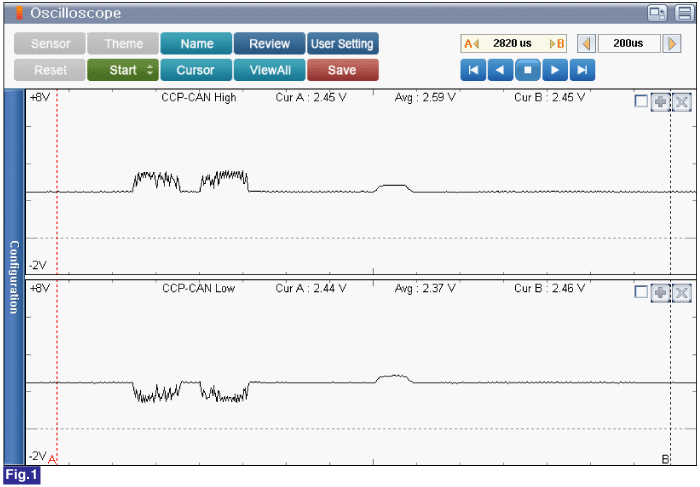Has a problem been found?
 | ▶ Repair as necessary and then go to "Verification of Vehicle Repair" procedure. |
 | ▶ Go to "Power Circuit Inspection" procedure. |
Many malfunctions in the electrical system are caused by poor harness and terminals.
Faults can also be caused by interference from other electrical systems, and mechanical or chemical damage.
Thoroughly check all connectors (and connections) for looseness, bending, corrosion, contamination, deterioration, and/or damage.
Has a problem been found?
 | ▶ Repair as necessary and then go to "Verification of Vehicle Repair" procedure. |
 | ▶ Go to "Power Circuit Inspection" procedure. |
Ignition switch "OFF"
Refer to "Shop Manual" and disconnect PM sensor connector.
Ignition switch "ON"
Measure the voltage between Pin No. 4 (Power) terminal of PM sensor harness connector and chassis ground.
Specification : B+
Is the measured value within specification?
 | ▶ Go to "Ground CIrcuit Inspection" procedure. |
 | ▶ Inspect and repair open or short in circuit, and then go to "Verification of Vehicle Repair" procedure. |
Ignition switch "OFF"
Disconnect batter (-) cable.
Refer to "Shop Manual" and disconnect PM sensor connector.
Measure the resistance between Pin No. 1 (Ground) terminal of PM sensor harness connector and chassis ground.
Specification : Approx. below 1Ω
Ignition switch "OFF"
Refer to "Shop Manual" and disconnect PM sensor connector.
Ignition switch "ON"
Measure the voltage between Pin No. 4 (Power) terminal of PM sensor harness connector and chassis ground.(A)
Measure the voltage between Pin No. 4 (Power) terminal and Pin No. 1 (Ground) terminal of PM sensor harness connector.(B)
Specification : Difference in (A) and (B) is less than 200 mV
Is the measured value within specification?
 | ▶ Go to "CAN Communication Line Inspection" procedure. |
 | ▶ Inspect and repair open or short in circuit, and then go to "Verification of Vehicle Repair" procedure. |
Ignition switch "OFF"
Disconnect battery (-) cable.
Refer to "Shop Manual" and disconnect ECM and PM sensor connector.
Measure the resistance between Pin No. 62 (CCP-CAN High) terminal of ECM harness connector and Pin No. 3 (CCP-CAN High) terminal of PM Sensor harness connector.
Measure the resistance between Pin No. 79 (CCP-CAN Low) terminal of ECM harness connector and Pin No. 2 (CCP-CAN Low) terminal of PM Sensor harness connector.
Measure the resistance between Pin No. 63 (CCP-CAN High) terminal of ECM harness connector and Pin No. 3 (CCP-CAN High) terminal of PM Sensor harness connector.
Measure the resistance between Pin No. 80 (CCP-CAN Low) terminal of ECM harness connector and Pin No. 2 (CCP-CAN Low) terminal of PM Sensor harness connector.
Specification : Approx. below 1 Ω
Is the measured value within specification?
 | ▶ Go to "Signal Circuit Inspection" procedure. |
 | ▶ Repair open in CCP-CAN circuit and then go to "Verification of Vehicle Repair" procedure. |
Ignition switch "OFF"
Connect VMI to GDS and set up the Oscilloscope.(2 Channel):
Channel A (+) : Pin No. 3 (CCP-CAN High) terminal (PM Sensor Harness Connector)
Channel A (-) : Ground
Channel B (+) : Pin No. 2 (CCP-CAN Low) terminal (PM Sensor Harness Connector)
Channel B (-) : Ground
Ignition switch "ON"
Specification : Refer to figure below

Fig.1) Normal CCP-CAN Signal Waveform
Is the measured value within specification?
 | ▶ Go to "Component Inspection" procedure. |
 | ▶ Inspect and repair open or short in circuit, and then go to "Verification of Vehicle Repair" procedure. |